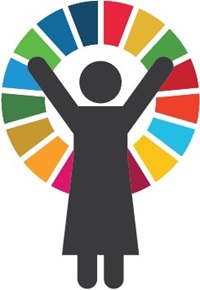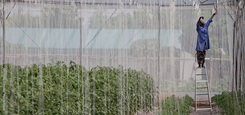Sustainable Development and Climate Change
Sustainable development requires action on three fronts: social, economic and environmental. Women are central to progress in each area, as reaffirmed by the 2012 Rio+20 agreement, which makes commitments to ensuring women’s equal rights and opportunities. This requires empowering women and dropping discriminatory barriers in diverse areas, among them agriculture, energy, health, education, employment and disaster risk reduction.
Our solutions
UN Women promotes women’s economic empowerment within the broader sustainable development agenda, with a focus on green economics and climate change. Our support for the Barefoot College in India has helped train illiterate older women from rural communities in various geographic regions, a particularly vulnerable group, on engineering skills. They learn to assemble and install solar lamp kits in their own and nearby villages, gaining an income while contributing to a cleaner environment. Alternative sources of light in rural areas off the electrical grid typically involve burning kerosene, a non-renewable resource that creates indoor air pollution. The Barefoot College now estimates its trained solar engineers save around 160,000 litres of kerosene a month across Africa, Asia and Latin America.
Dirty indoor air caused by burning wood or similar fuels for cooking is a source of sickness and death for poor women around the world. An additional burden comes from women spending long hours collecting fuel, allowing less time for other activities, such as those generating an income. UN Women is part of the Global Alliance for Clean Cook Stoves, which advocates establishing a global market for clean and efficient household cooking devices. In Ghana, UN Women’s Fund for Gender Equality has introduced green cook stoves in an area where climate change has fuelled rapid desertification. Women using the stoves have reported immediate health benefits and time savings. Those operating small cooking businesses report they are more productive; incomes have increased.
Our support for climate change mitigation and adaptation efforts includes assisting the 14 million members of the Viet Nam Women’s Union in building resilience to the floods and other natural disasters that occur more frequently each year. The initiative marks the first time in Viet Nam that a programme has encouraged women to participate in disaster risk reduction. Training sessions in particularly vulnerable localities teach local people to consider how disaster fallout may affect women, men and other groups differently. Women and girls, for example, are less likely to know how to swim than men and boys. Since 80 per cent of Vietnamese households have radios, radio soap operas air just prior to the rainy season to stress what women can do to prepare for disasters. The visibility of the project convinced at least one provincial city to make the Women’s Union a regular member of its main body for decision-making on natural disasters.
Since 2011, UN Women has sponsored the Gender Equality Award granted by the SEED Initiative, a global partnership for action on sustainable development and the green economy. It recognizes the leadership of women and women’s organizations. The most recent award went to a waste management initiative in Nepal involving more than 1,000 households and businesses. Run by a women’s environment committee and supported by a local municipality, it reduces waste through recycling, establishes biogas plants run on organic waste, and offers a savings and credit scheme for women.
Related links:



